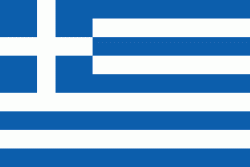Kastoria (Dimos Kastoria)
Kastoria (Καστοριά, Kastoriá ) is a city in northern Greece in the region of Western Macedonia. It is the capital of Kastoria regional unit, in the geographic region of Macedonia. It is situated on a promontory on the western shore of Lake Orestiada, in a valley surrounded by limestone mountains. The town is known for its many Byzantine churches, Byzantine and Ottoman-era domestic architecture, its lake and its fur clothing industry.
The city is first mentioned in 550 AD, by Procopius as follows: "There was a certain city in Thessaly, Diocletianopolis by name, which had been prosperous in ancient times, but with the passage of time and the assaults of the barbarians it had been destroyed, and for a very long time it had been destitute of inhabitants; and a certain lake chances to be close by which was named Castoria. There is an island in the middle of the lake, for the most part surrounded by water; but there remains a single narrow approach to this island through the lake, not more than fifteen feet wide. And a very lofty mountain stands above the island, one half being covered by the lake while the remainder rests upon it." Although Procopius refers to it as "a city of Thessaly", the description is undoubtedly that of Kastoria, a city on a promontory in a lake.
There are several theories about the origin of the name Kastoria. The dominant of these is that the name derives from the Greek word κάστορας (kástoras, meaning "beaver"). Trade in the animal's fur, sourced from nearby Lake Orestiada, has traditionally been an important element of the city's economy. Other theories propose that the name derives from the Greek word κάστρο (kástro, meaning "castle"; from the Latin word castra) or from the mythical hero Κάστωρ (Kástōr), who may have been honoured in the area. The word is sometimes written with a C, Castoria, especially in older works. From Greek, the name was borrowed into Turkish as Kesriye. The Bulgarian, Macedonian and Serbian name of the city is Kostur (Cyrillic: Костур). The Albanian name is Kosturi, while the Aromanian name is Castoria.
The city is first mentioned in 550 AD, by Procopius as follows: "There was a certain city in Thessaly, Diocletianopolis by name, which had been prosperous in ancient times, but with the passage of time and the assaults of the barbarians it had been destroyed, and for a very long time it had been destitute of inhabitants; and a certain lake chances to be close by which was named Castoria. There is an island in the middle of the lake, for the most part surrounded by water; but there remains a single narrow approach to this island through the lake, not more than fifteen feet wide. And a very lofty mountain stands above the island, one half being covered by the lake while the remainder rests upon it." Although Procopius refers to it as "a city of Thessaly", the description is undoubtedly that of Kastoria, a city on a promontory in a lake.
There are several theories about the origin of the name Kastoria. The dominant of these is that the name derives from the Greek word κάστορας (kástoras, meaning "beaver"). Trade in the animal's fur, sourced from nearby Lake Orestiada, has traditionally been an important element of the city's economy. Other theories propose that the name derives from the Greek word κάστρο (kástro, meaning "castle"; from the Latin word castra) or from the mythical hero Κάστωρ (Kástōr), who may have been honoured in the area. The word is sometimes written with a C, Castoria, especially in older works. From Greek, the name was borrowed into Turkish as Kesriye. The Bulgarian, Macedonian and Serbian name of the city is Kostur (Cyrillic: Костур). The Albanian name is Kosturi, while the Aromanian name is Castoria.
Map - Kastoria (Dimos Kastoria)
Map
Country - Greece
 |
 |
| Flag of Greece | |
Greece is considered the cradle of Western civilization, being the birthplace of democracy, Western philosophy, Western literature, historiography, political science, major scientific and mathematical principles, theatre and the Olympic Games. From the eighth century BC, the Greeks were organised into various independent city-states, known as poleis (singular polis), which spanned the Mediterranean and the Black Sea. Philip II of Macedon united most of present-day Greece in the fourth century BC, with his son Alexander the Great rapidly conquering much of the ancient world, from the eastern Mediterranean to the North Western parts of India. The subsequent Hellenistic period saw the height of Greek culture and influence in antiquity. Greece was annexed by Rome in the second century BC, becoming an integral part of the Roman Empire and its continuation, the Byzantine Empire, which was culturally and linguistically predominantly Greek.
Currency / Language
| ISO | Currency | Symbol | Significant figures |
|---|---|---|---|
| EUR | Euro | € | 2 |
| ISO | Language |
|---|---|
| EN | English language |
| FR | French language |
| EL | Greek language |















